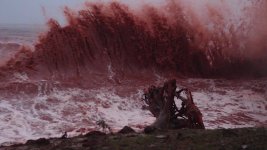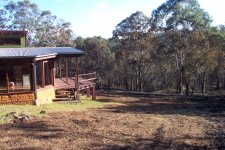hunterjwizzard
Veteran Member
- Joined
- Mar 20, 2020
- Messages
- 2,302
I decided to post my story here because, well, I don't really talk to many people.
I live in the small town of Camarillo in Ventura County, which made international news yesterday for the wind-driven fire that blasted through part of our suburbs, destroying 133 homes. Aside from being the location of the Hotel California, this is the most interesting thing to happen here.
I was there first hand and have spent the past 2 days evacuated. I am happy to say myself, my wife, and our cats are completely unscathed, they my senile elderly cat is a bit of an asshole. My home and much more importantly my collection of mostly terrible vintage computers is safe. I also got my magic cards out. Because I know hot to prioritize in an evacuation.
Now I would like to share a side of this story that isn't coming through very clearly on the news. Everyone watching from out of state is probably thinking "Ah! California is on fire again? That's their thing." And indeed it is, but in my small town it was never "our" thing. The town is surrounded on all 4 sides by agricultural fields. When we bought our house, my wife expressed some concerns about fires since we were very technically on the outskirts of town(actually my street is "outside" of town in the sense that the town curves around us. City borders are weird.). I showed her a map and I said "look, this hilly area here you're worried about? That's all expensive homes with good fire protection. The other side of the hill is agriculture. There's this one tiny little brush area here but its protected by these fields on the other side of it. We are completely safe."
Oh how I was so very, very wrong.
We have a wind event that happens here a couple times a year called the Santa Annas(named after General Santa Anna, because I guess people hated him too?). These winds can gust up to 50 miles per hour and drop the relative humidity down into the single digits. Wednesday morning these winds turned an ordinary brush fire into a flamethrower that followed the path of the wind. It followed the "impenetrable" ridge line where the winds were highest, jumping any firebreak and torching house after house. Over the last 36 hours I've watched a fire tear through an area I thought completely safe from fires.
As did pretty much everyone I've spoken to in town. We're all absolutely shocked.
Now I'm getting into the real reason I made this post. Whoever you are, wherever you live, you need a personal evacuation plan. I have extensive, actual written disaster plans for my and my parent's hosue, all of which assumed the worst disaster that could befall us was an earthquake(I guess California is known for a third thing). Those plans always assumed shelter-in-place. Yesterday, I had to evacuate. I was not prepared to evacuate.
So that's my cautionary tale. Do with it as you will.
I live in the small town of Camarillo in Ventura County, which made international news yesterday for the wind-driven fire that blasted through part of our suburbs, destroying 133 homes. Aside from being the location of the Hotel California, this is the most interesting thing to happen here.
I was there first hand and have spent the past 2 days evacuated. I am happy to say myself, my wife, and our cats are completely unscathed, they my senile elderly cat is a bit of an asshole. My home and much more importantly my collection of mostly terrible vintage computers is safe. I also got my magic cards out. Because I know hot to prioritize in an evacuation.
Now I would like to share a side of this story that isn't coming through very clearly on the news. Everyone watching from out of state is probably thinking "Ah! California is on fire again? That's their thing." And indeed it is, but in my small town it was never "our" thing. The town is surrounded on all 4 sides by agricultural fields. When we bought our house, my wife expressed some concerns about fires since we were very technically on the outskirts of town(actually my street is "outside" of town in the sense that the town curves around us. City borders are weird.). I showed her a map and I said "look, this hilly area here you're worried about? That's all expensive homes with good fire protection. The other side of the hill is agriculture. There's this one tiny little brush area here but its protected by these fields on the other side of it. We are completely safe."
Oh how I was so very, very wrong.
We have a wind event that happens here a couple times a year called the Santa Annas(named after General Santa Anna, because I guess people hated him too?). These winds can gust up to 50 miles per hour and drop the relative humidity down into the single digits. Wednesday morning these winds turned an ordinary brush fire into a flamethrower that followed the path of the wind. It followed the "impenetrable" ridge line where the winds were highest, jumping any firebreak and torching house after house. Over the last 36 hours I've watched a fire tear through an area I thought completely safe from fires.
As did pretty much everyone I've spoken to in town. We're all absolutely shocked.
Now I'm getting into the real reason I made this post. Whoever you are, wherever you live, you need a personal evacuation plan. I have extensive, actual written disaster plans for my and my parent's hosue, all of which assumed the worst disaster that could befall us was an earthquake(I guess California is known for a third thing). Those plans always assumed shelter-in-place. Yesterday, I had to evacuate. I was not prepared to evacuate.
So that's my cautionary tale. Do with it as you will.


